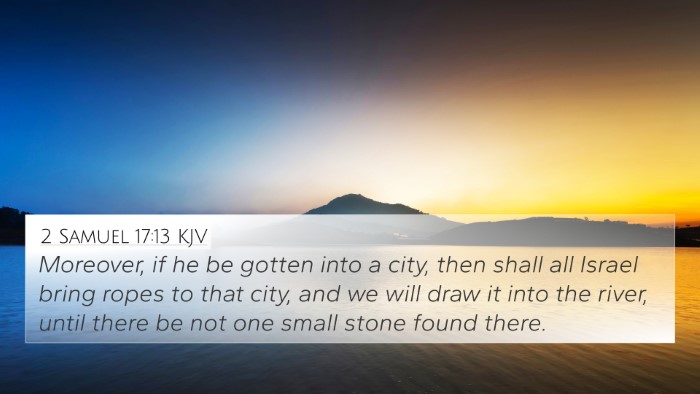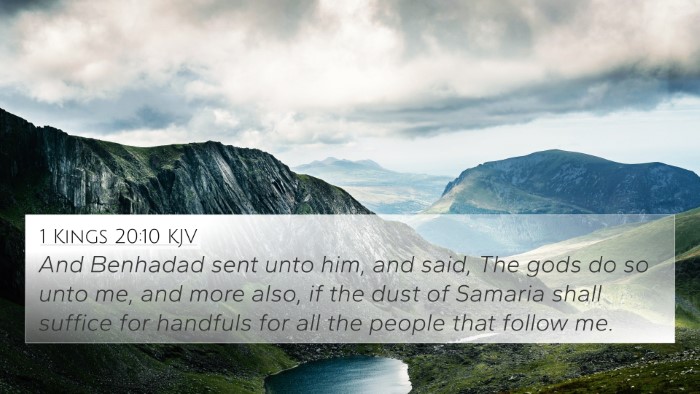Understanding 2 Kings 19:24
Bible Verse: 2 Kings 19:24
Verse Context: This passage occurs in the context of King Hezekiah of Judah facing the Assyrian siege, particularly dealing with the threats made by King Sennacherib of Assyria. Hezekiah’s plea to God through prayer highlights his confidence in divine protection and intervention.
Verse Meaning: In 2 Kings 19:24, Sennacherib boasts about how he has dug wells and conquered territories, emphasizing his power and success. This verse illustrates the arrogance of worldly powers in contrast to God's sovereignty. The verse reveals Sennacherib's reliance on his military conquests while dismissing Judah's God.
Commentary Insights
- Matthew Henry:
Henry notes that Sennacherib's arrogance is a common trait among oppressors who forget that their accomplishments are ultimately under God's control. This passage serves as a reminder of God’s ultimate authority over all nations and their rulers.
- Albert Barnes:
Barnes emphasizes the futility of human pride against divine omnipotence. He indicates that while Sennacherib may boast, his arrogance does not shield him from God’s impending judgment which aligns with the larger narrative of God delivering His people.
- Adam Clarke:
Clarke points out that the verse serves as a warning against overconfidence in military strength without the acknowledgment of God’s power. The idea is clearly that God can dismantle even the most formidable enemy if it serves His purpose.
Related Bible Cross-References
- Isaiah 36:1-3: This passage discusses Sennacherib’s siege and further illustrates the circumstances surrounding Hezekiah’s prayer.
- 2 Kings 19:20-21: This is God’s response to Hezekiah’s prayer—demonstrating God’s assurance and intervention amidst threats.
- Psalms 2:1-4: These verses reflect on the futility of nations conspiring against God and His anointed.
- Isaiah 37:23: This verse highlights God’s questioning of Sennacherib’s arrogance, emphasizing His ultimate authority.
- Jeremiah 48:29: Reflects on the pride of Moab, paralleling the themes of pride and impending judgment found in Sennacherib’s attitude.
- Proverbs 16:18: This proverb emphasizes that pride comes before destruction, a clear theme mirrored in Sennacherib’s boastfulness.
- Isaiah 10:12: This indicates how Assyria is used as a tool by God, demonstrating that even powerful nations serve a greater divine purpose.
Thematic Connections in Scripture
This verse contributes to various overarching themes in Scripture, particularly:
- Human vs. Divine Power: The juxtaposition of earthly powers against the might of God is a recurring theme.
- God’s Sovereignty: Maintaining trust in God amid adversity is emphasized in many books, especially during times of national crisis.
- The Role of Prayer: Hezekiah's reliance on God through prayer emphasizes the importance of seeking divine help during turmoil.
Application for Study
Studying 2 Kings 19:24 can provoke deeper reflections on several relevant issues in contemporary faith contexts:
- How should believers respond to worldly powers that oppose faith? Historical narratives provide insights into maintaining spiritual integrity.
- In what ways does this event showcase God’s active role in human affairs? Reflecting on divine intervention offers hope amid struggles.
- What lessons can be learned about pride and reliance on God? This verse serves as a reminder of humility and dependence on divine strength.
Conclusion
2 Kings 19:24 serves as a pivotal reminder of God's supremacy over human pride and the importance of trust in divine authority. Through careful cross-referencing and thematic connections, one can delve deeper into the narrative and extract potent lessons for personal application and understanding of God’s nature.







